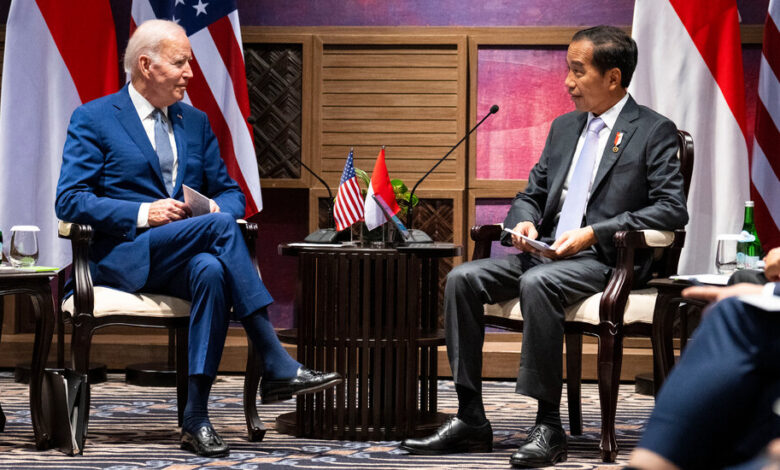
[ad_1]
President Biden and President Joko Widodo of Indonesia will announce on Monday a new strategic partnership, though their differences over the war in Gaza are likely to shape the Indonesian leader’s visit to Washington.
Mr. Joko, whose country is home to the largest Muslim population in the world, arrives in Washington after attending a summit in Saudi Arabia where he condemned the war in Gaza and blamed Israel for an attack on the Ahli Arab Hospital in Gaza City. American intelligence agencies say they have high confidence the blast was caused by a Palestinian rocket. Mr. Joko is the first Islamic world leader to visit the White House since the war began.
A senior administration official who previewed the call for reporters on Sunday evening said that Indonesia’s view on the war “is very important in how we think about our own next steps,” and that Mr. Biden would “listen carefully” to Mr. Joko during their meeting. John F. Kirby, a White House spokesman, told reporters last week that the president would “make it clear that the United States stands with Israel.”
In recent weeks, tens of thousands have gathered in the streets of Jakarta to call for a cease-fire in Gaza. Indonesia does not have formal diplomatic ties with Israel, and Mr. Joko is under pressure by human rights groups to press Mr. Biden to call on Israel for a cease-fire.
Mr. Biden’s advisers are hoping that diplomatic comity can withstand tensions over Gaza, and they emphasized on Sunday that Mr. Joko would be treated to an Oval Office meeting before joining a larger group of officials in the Cabinet Room for afternoon tea. Cementing a new strategic partnership with Indonesia bolsters the president’s efforts to draw countries in the Indo-Pacific closer to the United States as concerns grow over China’s aggression in the region.
Indonesia matters to the United States in part because of its sheer size. With around 280 million people, it is the world’s fourth most populous country. It is resource abundant — it is the world’s biggest nickel producer — and has a fast-growing trillion-dollar economy. Its policies on climate change and the environment affect the world, though critics have said its quest to increase nickel production comes at the cost of producing greenhouse gas emissions.
(When Mr. Biden traveled to Indonesia for the Group of 20 summit a year ago, Mr. Joko gave both the president and reporters a tour of a mangrove farm in Bali, and touted their ability to clear the air and combat climate change.)
The country is also seen as pivotal in the geopolitical battle between Washington and Beijing. China has cultivated much closer ties with Indonesia under Mr. Joko.
The announcement, which comes two days before Mr. Biden is scheduled to meet with President Xi Jinping of China at a highly choreographed summit in San Francisco, places the United States on the same diplomatic footing as Beijing, which announced a comprehensive relationship with Jakarta in 2013. The new pact is seen by Mr. Biden and his advisers as evidence that concern over China has made leaders in the region more interested in partnering with the United States than they once were.
Mr. Joko likes to say he remains independent of either country’s influence. But he has shown a special affinity for Mr. Xi and has traveled to China five times throughout his time in office. China was the second-largest investor in Indonesia, after Singapore, in 2022.
In September, Chinese Premier Li Qiang pledged $21.7 billion in new Chinese investment in Indonesia to strengthen the countries’ economic and political ties. Mr. Joko, whose term ends next year, sees infrastructure as a signature legacy, and he has turned to China to help him achieve his goals.
But Mr. Joko also knows that Indonesia needs to find a hedge. Chinese investments in the country have led to discontent, and he also knows that Indonesia needs to diversify foreign investment. One of the top priorities on his agenda would be to reach an agreement with the United States over supplies of the critical minerals used to make car batteries.
Indonesia wants to generate greater demand for its nickel by making it eligible for the American tax credits under the Inflation Reduction Act. Companies would then be more interested to build smelters and electric vehicle factories in Indonesia, creating jobs for Indonesians.
The country wants a similar kind of preferential access that was granted earlier this year to Japan, either through an independent deal or as part of a limited free trade agreement. But some U.S. officials have expressed concern about Indonesia’s problematic environmental and human rights records, especially when it comes to nickel mining. Any deal is likely to run up against opposition in Congress.
In Washington, Mr. Biden and Mr. Joko were expected to discuss a plan for an agreement on critical minerals and semiconductors, and to discuss climate issues, including carbon capture and storage, the electricity grid and air quality.
The two were also scheduled to discuss security cooperation, including on cybersecurity, and a new initiative for a satellite program at Georgetown University, the first American university to open a campus in Indonesia.
Peter Baker contributed reporting.
Source link




